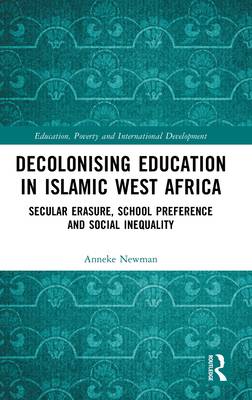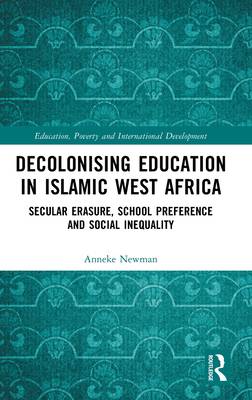
- Retrait gratuit dans votre magasin Club
- 7.000.000 titres dans notre catalogue
- Payer en toute sécurité
- Toujours un magasin près de chez vous
- Retrait gratuit dans votre magasin Club
- 7.000.0000 titres dans notre catalogue
- Payer en toute sécurité
- Toujours un magasin près de chez vous
Decolonising Education in Islamic West Africa
Secular Erasure, School Preference and Social Inequality
Anneke NewmanDescription
This book uses perceptions and experiences of Qur'anic schools in West Africa to outline a much-needed postsecular approach, reconsidering the place of Islamic education within African decolonial debates about educational pluralism, and the contributions of religious perspectives in academic and international development spaces.
Decolonial theory is used to overcome the challenges of problematic Eurocentric and colonialist stereotypes about religious actors and faith-based schools which persist within international education scholarship and global policy agendas. Through fine-grained ethnography, chapters discuss how parents and young people today engage with classical Qur'anic schools, Islamic schools and French-medium secular education in Senegal, thereby exposing inequalities around gender, descent-based or caste identities and socioeconomic status, as well as their influence on young people's pursuit of knowledge. These findings are valuable for scholars exploring the development-education-religion nexus and promoting Education for All in communities characterised by other-than-secular worldviews.
The book will be of interest to academics, researchers and postgraduate students working in the sociology of education, international education, anthropology and religious education. Practitioners involved in postcolonial and decolonial debates will also benefit from recommendations regarding educational reform in plural educational contexts.
Spécifications
Parties prenantes
- Auteur(s) :
- Editeur:
Contenu
- Nombre de pages :
- 288
- Langue:
- Anglais
- Collection :
Caractéristiques
- EAN:
- 9781032000442
- Date de parution :
- 24-12-24
- Format:
- Livre relié
- Format numérique:
- Genaaid
- Dimensions :
- 156 mm x 234 mm
- Poids :
- 603 g

Les avis
Nous publions uniquement les avis qui respectent les conditions requises. Consultez nos conditions pour les avis.






